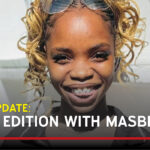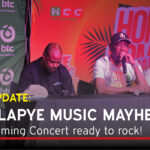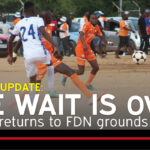GBV survivor trail blazes the wheelchair basketball field
Malebogo Max Molefhe is a former Botswana Basketball national team Captain who was shot eight times by her boyfriend in 2009 and became crippled due to spinal injury.
The 39-year-old Manyana born sports woman is now an activist advocating for survivors of gender based violence and domestic abuse.
She has formed Malebogo Max Foundation aimed at developing strategies to end gender-based violence and offer supportive services that empower survivors.
The foundation also hosts the annual wheelchair basketball tournament.Last week Diamond Trading Company sponsored the Max Foundation with P463 000.

Voice Reporter Portia Mlilo had a chat with this gender based violence survivor about her experiences, the mandate of Malebogo Max Foundation and the wheelchair basketball tournament.
Q. What made you start this foundation?
A. Initially after my traumatic experience of violence, I used my story to motivate, educate and inspire individuals through voluntary public speaking engagements.
Little did I know the world was watching and that this was a powerful movement that would change my life?
After being awarded the International Woman of Courage award in Washington DC in 2017, I started gaining more recognition, which came with too many responsibilities.
This challenged me to profile my work and expand my outreach in serving my country better hence making the decision to legally register an NGO.
Q. What is the mandate of this foundation?
A. The Malebogo-Max Foundation Trust’s mandate is to raise the development potential of rural marginalised women and underprivileged girls aiming for gender equality and the eradication of Gender Based violence through empowering and mobilising towards their participation in decision making and enabling them to lead a self-sustained life.
Q. What can you say are some of your greatest achievements as the foundation?
A. The foundation continues to make strides in contributing to ending violence through various programmes that it runs and through working in collaboration with other stakeholders in the GBV and disability.
Moreover we have successfully hosted the Malebogo-Max wheelchair Basketball Tournament for three years now consecutively, which is aimed at advancing the inclusion of persons with disabilities in sports.
Q. What are some of your challenges in running your tournament?
A. The main challenge we face is the lack of preparedness of local teams and lack of developmental funds.
Teams struggle to maintain their participation in sports because of lack of financial support.
There are no proper basketball courts to accommodate persons with disabilities and because of other barriers such as the lack of access to public transport; it’s difficult to keep up with training.
In general PWDs face surmounted obstacles, which hinder their progress.
The lack of team funding adds to this misery.
Therefore to carry out a tournament of this magnitude, we need a lot of funding to accommodate the extra needs of PWDs.
I am glad DTCB has sponsored the tournament and part of the money will be used to but wheelchairs for players.
Q. This annual tournament has been taking place toward end of the year, what made you change the dates?
A. Originally it was aligned to the commemorative 16 days of Activism against GBV on women and children, which takes place every year starting from 25th November to 10th December.
This resonated well with the tournament concept.
Persons with disabilities are at greater odds of experiencing violence than their normal peers but are often excluded from programmes that address violence.
So in order to improve their knowledge and participation in GBV programmes we came up with the idea to use the power of sports to get people together under one platform and share messages that are aimed at zero tolerance to GBV also using the platform to advance the inclusion of persons with disabilities in sports and giving them the opportunity to explore their capabilities.
Q. Any plans of extending Wheel Chair basketball to other parts of the country?
A. Yes. We are currently reaching out and consulting with various Disabled Person’s Organisations to see how they too can partake in wheelchair basketball and build teams that can compete in future.
Q. What are some of your future plans with this tournament?
A. Some of the plans include conducting workshops or coaching clinics to educate wheelchair athletes about the laws and processes of playing this sport and building strong teams.
It is very important for us to see the tournament grow, we want to build athletes that can contend outside the country and eventually have an Allstars team that can even participate at the Paralympics.
Q. Apart from the tournament what else do you do as an activist to spread gender based violence awareness?
A. I do a lot of work, which is not limited to voluntary public speaking engagements in collaboration with other organisations.
I do a lot of corporate mentoring and empowerment for staff in prominent organisations in Botswana and I am often a guest speaker at various platforms, joint partnerships, Law Enforcement and high-level forums on gender-based violence and human trafficking.
I have sat in forums that brought together police commissioners, judges, and chief prosecutors from African countries to set the tone and advocate for victim support and a positive investigative environment.
Besides encouraging active participation in sports for people with disabilities while advocating for their inclusion, I also lead and conduct Spinal cord active rehabilitation camps annually in collaboration with the Ministry of Health and wellness as well as Active Rehabilitation Sweden and Poland.
Q. How has your situation changed your life in general?
A. It has taught me the power of acceptance.
I have learnt to accept my situation and allowing myself to grow from pain to strength.
It has also made me symbolic enough to inspire others who may be in situations of violence but not able to get out.
I know that my story is a powerful tool that continues to impact change hence I use my strengths and capabilities for a positive change.
I’m now empowered and have a positive outlook to life.
I have found my purpose and now living to fulfilling it and I am exactly where God wants me to be.
I am a woman of courage.
Q. How did you do it, how did you manage to move on with your life and survive stigma?
A. Surviving the attack was one of the most difficult and long-lasting experiences of my life.
Firstly, there was the trauma part.
I had to fight for bare survival only to undergo many years of recuperation, which included rehabilitation.
It was a painful time of my life, filled with confusion, misery and pain.
Secondly, there was the emotional and psychological part, I had regrets, how could somebody who apparently loved me try to take my life, how could I have failed to see the red flags, how could I take it and take it and forgive it, how could I adjust to a life in a wheelchair, how would I ever earn a living again, how could I be independent and how could I ever feel safe to be with a man again.
Lastly, there was the disability. Once you use a wheelchair people look at you differently, they see you as fragile, less able and maybe less important.
In addition, conducting the most normal tasks like my daily care requires assistance now, going to the clinic or continuing my education requires now specialized transport and accessibility of facilities.
Q. Why do you think it is still difficult to stop gender-based violence?
A. There are many factors that contribute to the rise of GBV and despite this rise in numbers there is lack of commitment from individuals to change behaviors.
We still fail to see the red flags of violence especially sexually related.
We fail to take accountability in terms of reporting incidents of violence.
Other contributors stem from the use of social media that exposes young girls to sex predators.
Women often report acts of violence then later withdraw charges making it difficult for police to prosecute perpetrators.
Laws and policies also need to be changed to protect victims and survivors of violence so that stringent measures can be taken.
Perpetrators of violence have too many rights that hinder them from being rehabilitated hence they roam the streets and continue to violate unsuspecting individuals.
Q. Last year you received the BNSC Chairman’s award, what did it mean to you?
A. That was totally unexpected. I felt extremely honoured and was lost for words.
Often times we do voluntary work without expecting anything in return then one day, you get recognised and awarded.
That was special and I was so excited that I was overcome with tears of joy.
I’m so grateful for the sterling contributions I made in advancing inclusion of people with disabilities in sports and so proud of myself.
Q. Who is your inspiration?
A. My biggest inspiration is my Mother.
She has an overwhelming willingness to give love.
She is courageous and patient.
I draw strength from her.
Q. What advice can you give to other people living with disabilities?
A. The usual simple quote, disability is not inability.
There’s so much power to these words.
There is so much to explore, there is always that silver lining.
There are endless possibilities, just dream on and try.
As long as you still have air in your lungs, nothing is impossible.
Q. Thank God it’s Friday, what are your plans for the weekend?
A. It is my birthday this weekend.
I am turning a new leaf.
On Sunday I will be celebrating my 40th birthday.
It also marks the International Women’s day.
I feel exceptionally blessed to be celebrating with women across the world.
To this I say, happy Women’s day.
Let love and light lead!













